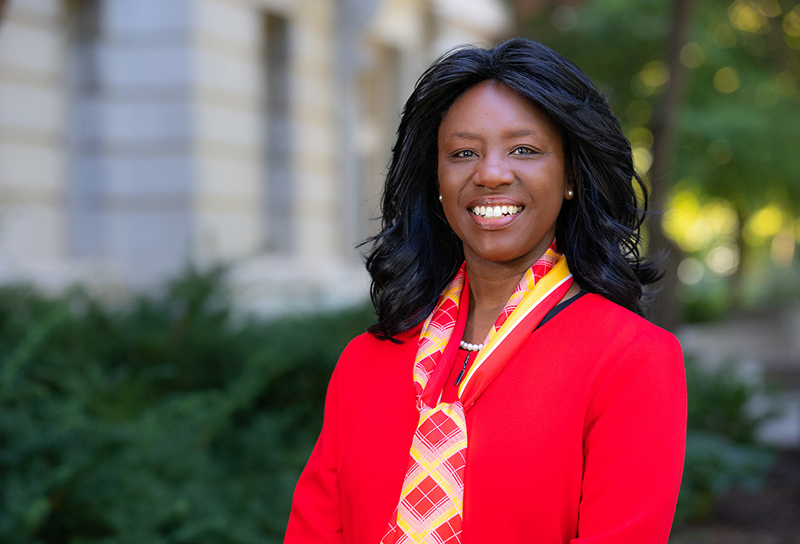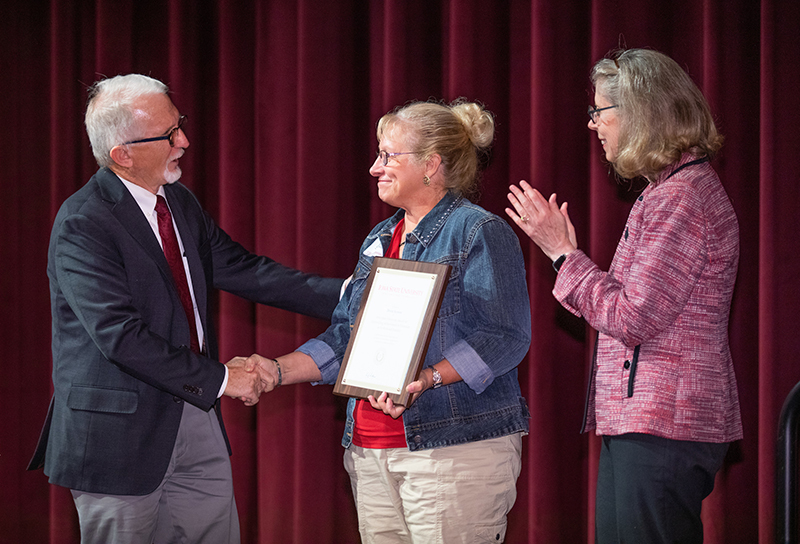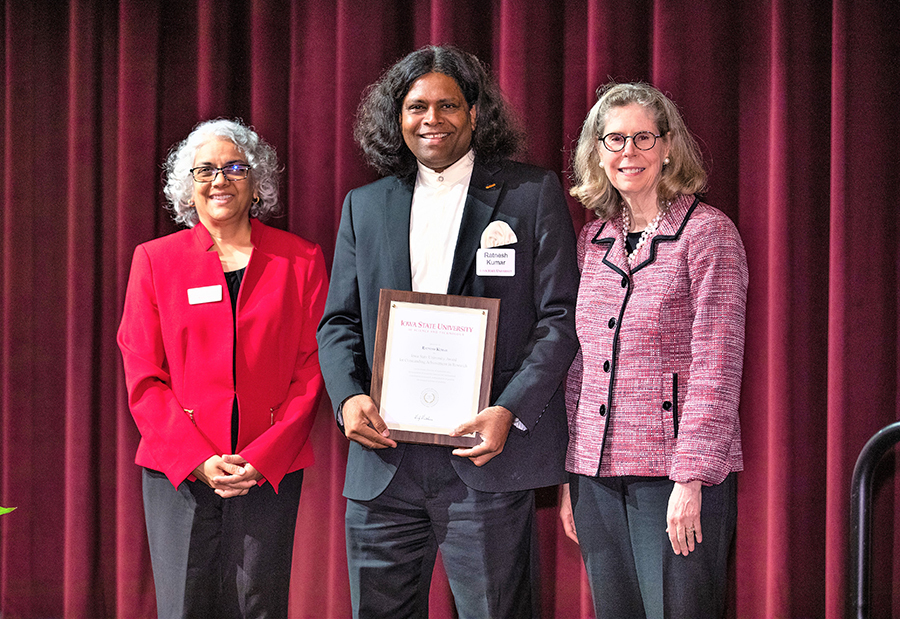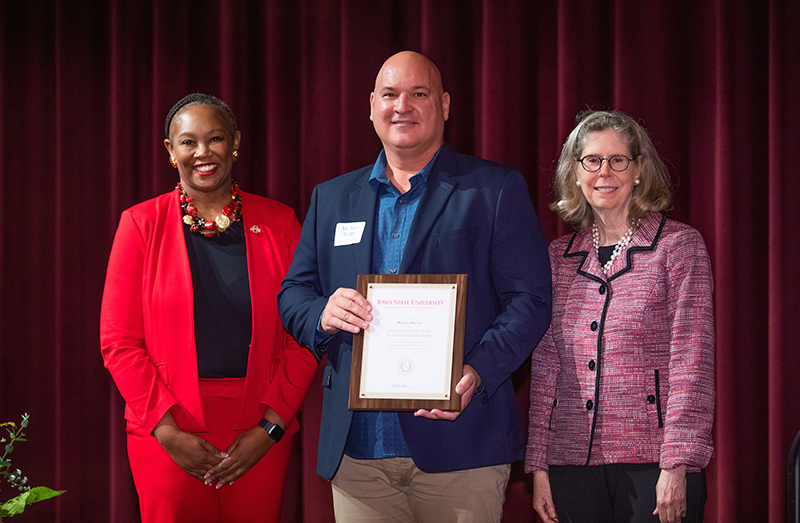Getting ready for winter

Photos by Christopher Gannon.
A significant project to protect the College of Design building against wind and moisture this fall replaces the 44-year-old window "ribbons." Crews have started removing old windows and installing tinted, high-efficiency glass windows. The project covers exterior windows on six levels (ground through five); it doesn't include the barrel window running the length of the roof or the curtain window at either end of the center atrium. Weather permitting, each side of each floor should require seven workdays to replace the length of windows, necessitating short relocations within the building for staff and faculty.
Intended as a summer project, delivery challenges delayed much of the work until the first week of September. According to project manager David Blum, facilities planning and management, one other major component of the project is about 85% complete: Replacing the caulk between expansion joints in the building's concrete panels to seal out moisture.
Perks to working at ISU you might not know about
Most employees know Iowa State's benefits package includes substantial retirement plan contributions, ample vacation and sick time off, and affordable and high-quality health, prescription and dental insurance, among other offerings.
For more information
See the procurement office's online listing of employee discount programs and UHR's information on additional benefit programs.
But faculty and staff also are eligible for numerous deals and programs that aren't as well-known, such as discounts and free services from benefits providers, voluntary benefit programs and discounts from university-contracted suppliers that employees can use for personal purchases. Here are some examples:
Programs and services
Adoption assistance: A three-year pilot program launched July 1 reimburses employees for eligible expenses related to adopting a child, up to $5,000 per adoption. See the adoption assistance program information on the university human resources (UHR) website for more information.
Adventure2: UHR's well-being program provides incentives to support employees' health and wellness.
Disability income insurance: University-funded long-term disability insurance, free to faculty and staff after one year of employment, covers 63% of a disabled employee's salary. Principal Financial Group offers ISU faculty and staff supplemental disability income insurance to boost those payments to be closer to the recipient's prior salary.
Employee assistance program: Available to all benefits-eligible employees and immediate family members, the employee assistance program (EAP) offers free counseling, life coaching, financial and legal consultations, elder care and child resources and more. See a detailed list of benefits online.
Identity protection: Employees enrolled in ISU health insurance can sign up for identity protection services through their online myWellmark account or by calling 866-486-4812. You'll need your Wellmark ID card and the enrollment code (4170999624) to sign up. The service includes credit and web monitoring, fraud detection, identity recovery assistance and insurance for up to $1 million in reimbursement related to stolen identity.
An identity recovery kit also is available to employees enrolled in ISU life insurance if they sign up for an account with ARAG, offered by Principal. Use the ISU group policy number (1116190) to sign up online. EAP offers free identity theft resolution services, too.
Small loans: Greater Iowa Credit Union has a small-dollar loan program for Iowa State employees, as part of an ISU Extension and Outreach pilot project to improve financial wellness. It offers a personal loan of $500 to $2,500 at a 9.99% annual interest rate, no matter the borrower's credit history.
Student loan forgiveness: TIAA provides a service to help employees identify programs that can reduce or eliminate their student loan debt. Employees can use Savi for free to find loan relief opportunities or pay a monthly fee for concierge-style service, which includes processing applications and annual certifications. Employees don't have to be a TIAA client and can sign up online.
Travel assistance: Faculty and staff enrolled in ISU life insurance -- along with their spouses and dependents -- can use the AXA travel assistance program when an emergency strikes more than 100 miles away from home. Available services include medical referrals and transportation, interpretation services, lost item recovery, message delivery, political evacuation and legal referrals. AXA also offers pre-trip planning resources. See the program website for details.
Tuition reimbursement: After one year of ISU employment, professional and scientific and merit staff are eligible for tuition reimbursement for up to four credits of ISU coursework per semester (fall, spring and summer). See UHR's website for more details and application information.
Discounts and deals
Computers and software: ISU Book Store sells Dell and Apple devices to faculty and staff for personal use at a discount. As with all purchases at the ISU Book Store, there is no sales tax. See the store's TechCyte website for details. The bookstore also provides for employees' personal use Office365, a suite of Microsoft software products that includes Teams, Word, Excel, PowerPoint and more.
Health and wellness: Employees with ISU health insurance have access to Wellmark's Blue365, a service providing discounts related to nutrition, health, fitness, travel and more. See the deals or sign up at the Blue365 website.
Hearing aids: Free annual hearing screenings and up to 60% off on hearing aids are available to employees who are enrolled in either long-term disability or life insurance coverage. For more information on the services offered by Start Hearing, see the program information online or call 877-890-4694.
ISU Dining: Employees who sign up for the staff charge plan get $2 off breakfast and $3 off lunch and dinner at the all-you-can-eat campus dining centers at Friley Hall, Union Drive Community Center and the Maple-Willow-Larch Commons.
Legal help: Through ARAG, employees enrolled in ISU life insurance have access to a variety of do-it-yourself legal forms, such as a will, living will, and power of attorney for both health care and financial matters. Use the ISU group policy number (1116190) to sign up online.
Also, EAP services include a free 30-minute consultation with an attorney and a 25% discount for any further legal work from the consulting attorney.
Newspapers: All faculty, staff and students can subscribe for free to the New York Times and the Wall Street Journal. The University Library has guidance online about how to sign up.
Office and computer supplies: Employees can buy office supplies and equipment from ODP Business Solutions (formerly Office Depot Business Solutions) at the university's rates and receive free shipping. The same deal is available from CDW-G, which sells computers, printers and other office equipment.
Recreation services: Faculty and staff can join Recreation Services at a reduced rate of $30 a month, a membership that includes access to the fitness facilities at State Gym, Lied Recreation Athletic Center and Beyer Hall. See membership information online. A free 7-day trial is available.
Reiman Gardens: Faculty and staff receive 20% off any level of Reiman Gardens membership.
Vision: For a monthly premium, employees can purchase an Avesis eyewear plan that covers contact lenses and eyeglasses. Discounts on eyeglasses and lenses also are available to those enrolled in Delta dental insurance. Both Delta and Avesis provide discounts on laser vision correction, as does Principal for employees enrolled in either life or long-term disability insurance. Call 888-647-3937 or see the webpage for more information about Principal's discount.
Jump-start project helps students needing instruction outside of class
A lingering sign of the pandemic is the number of students who need additional help with homework and, at the same time, the challenge of providing that assistance.
Through the launch of a universitywide initiative to increase student retention and graduation rates, with a focus on first-generation and multicultural students and students whose academic progress was most impacted by the pandemic, they are receiving extra assistance. The initiative shows the immediate impact of the 2022-31 strategic plan on campus as part of one of nine jump-start projects backed by President Wendy Wintersteen.
Andrea Wheeler, faculty fellow for student success in the office of the senior vice president and provost, has worked with Academic Success Center (ASC) director Adriana Gonzalez-Elliott and college deans to provide additional assistance throughout the academic year.
"If students want tutoring, supplemental instruction or to use the Academic Success Center, those services should be available," Wheeler said.
Senior vice president and provost Jonathan Wickert discussed the initiative during the September Faculty Senate meeting, asking faculty to make students aware of the increased opportunities and dispel any stigma to seeking academic support.
Gonzalez-Elliott wants to be thoughtful when working with students who come to the ASC and build outreach to those who are not. Assistance isn't only available for those struggling, and it can be beneficial to everyone from first-generation students to those in their final semester, providing life skills for after graduation.
Tutoring and supplemental instruction
The need for tutors is high because the ASC is the only centralized tutoring service on campus and students can request additional support for any class. The 50-minute sessions happen in groups of two to five students twice a week and cost $5 per session.
"We were having a pretty high match rate between tutors and students prepandemic, we were hiring about 300 tutors each semester," Gonzalez-Elliott said. "We have had a harder time retaining tutors now because of pay, opportunities to be a teaching assistant and internship opportunities."
To increase the number of undergraduate tutors available -- especially in gateway classes with high 'D,' 'F' and withdraw rates -- the ASC raised pay to $15 an hour with jump-start and provost office funds. That increase impacts tutors, supplemental instructors, academic coaches and writing consultants. Gonzalez-Elliott said the pay increase already has had a positive impact.
Although tutoring gets results, Gonzalez-Elliott said supplemental instruction has a significant positive impact on student success and is a free service. Supplemental instruction -- seen as another form of tutoring -- meets three times a week and is led by an undergraduate student who has completed the course and attends it during the current semester. Forty-three courses currently have supplemental instruction, which doesn't cap the number of students who can attend.
During the spring 2022 semester, students who attended five to nine sessions had a mean GPA of 2.92 and those who attended 15 or more finished with a 3.22 GPA. That compares to a 2.67 GPA for students who did not attend any supplemental instruction sessions.
"The leaders are attending lectures with all of the students, they are able to follow the pace of the course and are added to the instructor's Canvas site," Gonzalez-Elliott said. "They are required to submit weekly lesson plans that we approve."
Colleges
Wheeler said she also asked college deans to increase all of the help options their colleges offer, with a pledge of funding help. Colleges sent proposals to the provost's office, and equal funding is being distributed to start offering additional academic support. Each college offers different forms of facilitated study sessions to suit the curriculum, with many led by graduate students.
Wheeler also has contacted instructors of classes with a history of challenging material to ask for their help identifying students who might be willing to help.
Five questions with the vice president for diversity, equity and inclusion

Vice president for diversity, equity and inclusion Sharon Perry Fantini. Photo by Christopher Gannon.
Vice president for diversity, equity and inclusion Sharon Perry Fantini ("fan-CHEE-nee") came to Iowa State in January, after a 20+ year career at Tiffin University, Ohio, that included time as a management faculty member and vice provost for equity, access and opportunity. Inside asked her to reflect on her first eight months as a Cyclone and share what's ahead.
What's occupied your first few months on campus?
Iowa State defines DEI
Diversity: Commitment to fostering a climate in all the ways people differ, including primary and secondary characteristics*, in a welcoming environment.
Equity: Commitment to fostering a climate where all individuals have access and opportunity to fully participate in the educational and working environment.
Inclusion: Commitment to fostering a climate where all individuals have a sense of belonging through support and respect to fully participate in the educational and working environment.
*From the Loden diversity wheel's internal and external filters we use to process information
One of the first things we did was work with senior leaders to define what DEI means for Iowa State (see box). We wanted to define these words in the broadest sense, inclusive of all identities, so we didn't use traditional words like male, female, age, veteran status on purpose because we didn't want an ever-growing list that could be outdated tomorrow. The test at each step was to ask people if they saw themselves in the definitions. Each definition includes measurements for success so we can evaluate what's working and what could be better.
What's at the top of your list this fall?
We're preparing to administer the next campus climate survey and tentatively planning to launch it in late January. We want to hear from everyone. I'm really looking forward to seeing the results and comparing them to the 2017 survey to see how far we've come and identify that next set of opportunities. From the survey results, we'll work with campus partners to develop a diversity action plan. It will be a partner to the university's strategic plan but with a direct focus on DEI. Broad participation in the survey is crucial to writing an effective diversity action plan that will help us become a more inclusive place.
What can individuals do to make ours a more inclusive campus?
Everyone has heard the phrase, 'Treat others the way you want to be treated.' I prefer, 'Treat others the way THEY want to be treated.' To find out how they want to be treated, you have to communicate, which includes listening. It sounds so simple, but we tend to shy away from it because we don't want to be wrong, and we're fearful of unintentionally hurting others. Sometimes it's because we don't know what word to use -- or not use. Until you engage with someone or do the research, you're not going to learn.
Iowa State has a strong DEI network on campus with multicultural student success coordinators, equity advisors, associate deans for diversity, etc. What's your experience with that network?
They report to their respective leaders -- deans and chairs, for example. So while we're not under the same umbrella, there are plenty of opportunities to work together. One of the reasons my office is structured under the president's division is to provide an institutional perspective on initiatives both in our division and around campus.
One example: We revitalized the former VPDI Council as a smaller Institutional Council on Diversity. I serve as chair and it has members from this office, the academic colleges and student affairs. Those leaders will work in their respective units and bring information and ideas back to the table for the diversity action plan. The council won't be solely responsible for creating the diversity action plan; it will collaborate with other groups such as the campus climate team.
The climate around DEI continues to morph. How do we create positive change amid all that?
Iowa State does not lack passion. People want to do the right thing for the right reasons. Our biggest challenge is understanding time and when we can move forward and when we need to pause and reevaluate. I believe we can get to where we want to go, but it matters how we get there; what words we're using, what words we're not using, and understanding the need to bring everyone into the conversation and explain our experiences.
We should also remember to celebrate the wins, big and small -- because there are days when they don't happen. Things will change, even if they don't change today.
Employee health care contribution increases reflect higher costs
The health insurance contributions Iowa State employees pay will go up Jan. 1, part of a multiyear plan to address rising costs in the university's health care program. Depending on the plan and who's covered in it, employee monthly premiums will go up $4-$19 in the PPO option and $4-$33 in the HMO plan.
President Wendy Wintersteen, vice president for university human resources Kristi Darr and interim senior vice president for operations and finance Heather Paris shared the new rates in a Sept. 26 email to all faculty and staff. Following its regular review of plan costs and current premiums, the employee benefits advisory committee (previously known as the university benefits committee) recommended the increases.
The enrollment window will open Nov. 1 for the next plan year, which mirrors the calendar year. Look for more information about open enrollment in Inside next month. Questions about increases to employee contributions may be directed to the fringe benefits office, fbac@iastate.edu.
Health plan monthly premiums
|
Coverage tier |
Blue HMO |
|
Blue PPO |
|
|
|
Jan. 1, 2023 |
Current |
Jan. 1, 2023 |
Current |
|
Employee only |
$29 |
$25 |
$49 |
$45 |
|
Employee + spouse/partner |
$152 |
$121 |
$298 |
$284 |
|
Employee + children |
$100 |
$83 |
$221 |
$202 |
|
Employee + family |
$193 |
$160 |
$382 |
$364 |
|
Family double spouse* |
$129 |
$108 |
$270 |
$254 |
*Paid by contract-holding spouse
Multiyear strategy
The 2023 plan year marks a third year of incremental premium increases, following seven years of flat employee contributions to their health care plans. In their Sept. 26 memo, the three leaders noted that Iowa State continues to pay almost 90% of the health care costs of the plans. Iowa State has used a self-funded model for employee health and dental care and prescription drug service since 1996.
Employees' annual premiums -- $348 for single coverage in the HMO, $588 in the PPO -- remain well below the national average of $1,299 for employer-sponsored health insurance for a single employee, they noted. For family coverage, the national annual average premium is $5,969 in an employer plan; ISU employees will pay $2,316 in HMO premiums, $4,584 in PPO premiums next year.
Related stories
Honoring years of diligent work

Photos by Christopher Gannon.
About 60 faculty and staff members received university awards during the annual ceremony Sept. 21 in the Memorial Union Great Hall. Here are just three of them.
(Top) Denise Schwab, Extension agriculture education specialist at the Iowa Beef Center, received the award for Outstanding Achievement in Extension or Professional Practice, which recognizes outstanding performance in statewide leadership in extension or professional practice and national recognition for outreach activities. Making the presentation were vice president for extension and outreach John Lawrence and President Wendy Wintersteen.
(Below) Ratnesh Kumar, Palmer Professor in Electrical and Computer Engineering, received an Outstanding Achievement in Research award from associate vice president for research Surya Mallapragada and Wintersteen. The award recognizes a tenured faculty member who has earned a national or international reputation for contributions in research or creative activity.
(Bottom) Michael Wigton, associate teaching professor in the Greenlee School of Journalism and Communication, received an Academic Advising Impact award, which recognizes outstanding performance by an academic advisor over an extended period. Presenting his award were Wintersteen and senior vice president for student affairs Toyia Younger.


